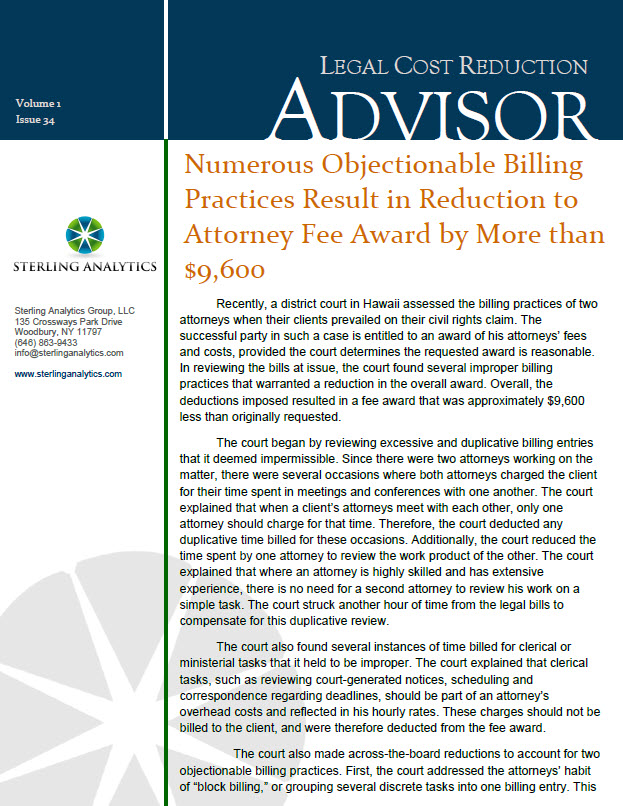Recently, a district court in Hawaii assessed the billing practices of two attorneys when their clients prevailed on their civil rights claim. The successful party in such a case is entitled to an award of his attorneys’ fees and costs, provided the court determines the requested award is reasonable. In reviewing the bills at issue, the court found several improper billing practices that warranted a reduction in the overall award. Overall, the deductions imposed resulted in a fee award that was approximately $9,600 less than originally requested.
The court began by reviewing excessive and duplicative billing entries that it deemed impermissible. Since there were two attorneys working on the matter, there were several occasions where both attorneys charged the client for their time spent in meetings and conferences with one another. The court explained that when a client’s attorneys meet with each other, only one attorney should charge for that time. Therefore, the court deducted any duplicative time billed for these occasions. Additionally, the court reduced the time spent by one attorney to review the work product of the other. The court explained that where an attorney is highly skilled and has extensive experience, there is no need for a second attorney to review his work on a simple task. The court struck another hour of time from the legal bills to compensate for this duplicative review.
The court also found several instances of time billed for clerical or ministerial tasks that it held to be improper. The court explained that clerical tasks, such as reviewing court-generated notices, scheduling and correspondence regarding deadlines, should be part of an attorney’s overhead costs and reflected in his hourly rates. These charges should not be billed to the client, and were therefore deducted from the fee award.
The court also made across-the-board reductions to account for two objectionable billing practices. First, the court addressed the attorneys’ habit of “block billing,” or grouping several discrete tasks into one billing entry. This practice, the court explained, makes court review for reasonableness incredibly difficult and a 15% reduction was imposed as a result. In addition, the court reduced the bills by an additional 20% to account for the improper practice of billing in quarter-hour increments. The court explained that billing in quarter-hour increments, rather than tenths of an hour, results in increased charges to the client, as every task must be rounded up to the nearest quarter hour.
Implications for Legal Billing: While the reductions imposed by the court were substantial, none of the billing practices that the attorneys engaged in was particularly egregious. Rather, these were common billing errors, and this case demonstrates the frequency with which billing standards are violated. The risk of duplicative billing entries is prevented by hiring only one attorney for the representation. However, there are many occasions where the benefit of having multiple, specialized attorneys, outweighs the risk of facing duplicative charges. If this is the case, it is important that a client review his or her legal bills to ensure they do not contain multiple charges for the same task, conference or communication. Perhaps the easiest billing practice to monitor is to insist that attorneys bill their time in tenths of an hour increments. This ensures the least amount of time is recorded on any one individual task and prevents “rounding up” and overcharging. While each of these billing practices is common, each is also preventable, and with careful review and instruction a client can ensure his or her attorney charges only what is proper and necessary for the representation.
*Robinson v. Plourde, 717 F. Supp.2d 1092 (D. Hi. 2010). Full copies of court decisions may be available through counsel or through various Internet links or paid services.
By Lauren Stulmaker


